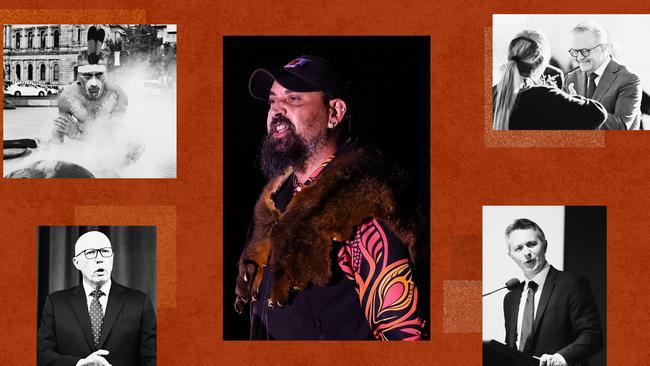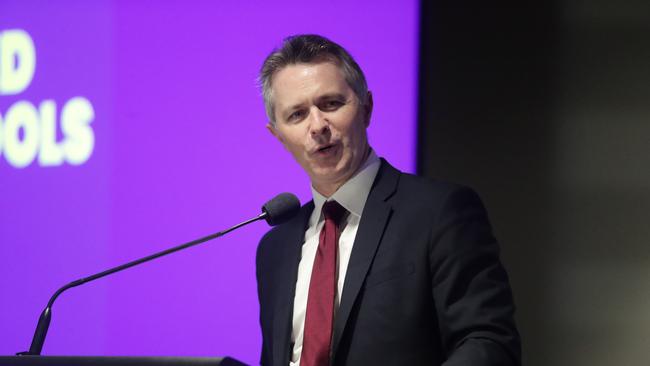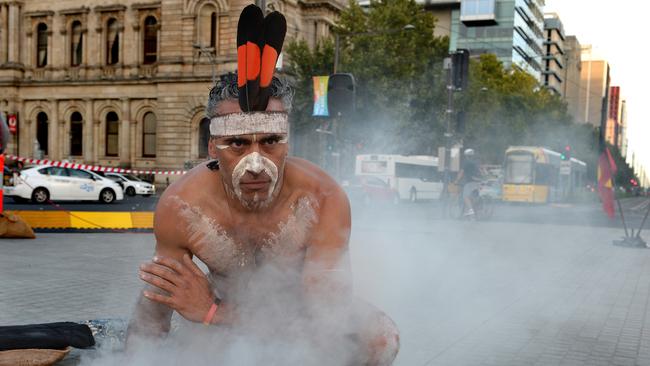
A news.com.au poll conducted last weekend on the subject has revealed that of the 163,000 responses, 23 per cent believe there should be fewer ceremonies held, and 67 per cent want to do away with them altogether. Only 10 per cent were in favour of the status quo or of increasing the number held.
To use the euphemistic parlance of social engineers when they land us with a fait accompli, it is time to have a conversation about this tradition. Call me cynical, but I have trouble recognising the goodwill credentials of a supposedly ancient ceremony that is all but mandatory for public gatherings and comes with a hefty invoice.
Nonetheless, it was despicable of a neo-Nazi to disrupt the welcome to country delivered by Bunurong elder Mark Brown at the dawn service at Melbourne’s Shrine of Remembrance last Friday. This was not the time nor the place to object.
But we could also do without disparaging those who question the extent and frequency of these ceremonies. When Opposition Leader Peter Dutton said on Monday that he did not believe Anzac Day dawn services warranted one, Education Minister Jason Clare was ready with a grubby insinuation.

“I don’t think any of us want to find ourselves on the same side of this argument as neo-Nazis,” he smugly observed on ABC News Breakfast.
There you have it. If you question the need for welcome to country, you stand with the neo-Nazis. It was the same tactic used to vilify the No campaign during the voice referendum. Is that the best argument you can offer, minister?
If anything, Indigenous commentators who defend the ceremonies end up vindicating the critics.
The practice is “not a political statement,” wrote Wiradjuri woman and University of Melbourne academic Jessa Rogers in Nine newspapers on Sunday.
“When a welcome to country is performed, it is about recognising that wherever you stand on this vast continent, you are on someone’s sovereign, unceded land,” she said.
Okay, so it is about making captive audiences “recognise” that they are interlopers, no matter where they live in Australia. And here was silly me thinking welcome to country was a political statement. How could I have been so wrong?
“It does nothing to divide us,” Rogers continued. “In fact, I would argue it unites us.”
Good point. I am sure Kaurna elder Katrina Ngaityalya Power was acting in the spirit of unity in 2023 when she gave a welcome to country for a South Australian government function in which she called for King Charles to be “dethroned” and told guests she deserved “better” applause. She also decried the outcome of the voice referendum, saying she could “understand” what it was like for Palestinians in the Gaza Strip.
Naturally Power did not wish to cause division in 2017 when she officiated at the dawn service at Adelaide’s National War Memorial, telling attendees they were on “stolen Kaurna land” and substituting a recital of the 23rd Psalm with her “Yea though I walk through the Valley of the Shadow of Invasion” reading.
Likewise, spectators at the NRL’s State of Origin match at Adelaide in 2023 would surely not have considered it political of Karuna elder Karl Winda Telfer to use his platform in the lead-up to the referendum to say “We need to have the conversations leading up to the end of this year” and “I think we’re mature enough to make the right call, yeah?”
As well as this apolitical and non-divisive ceremony unifying us by getting in our face at every opportunity, it also “speaks to the truth of Australia’s story” claims Rogers. Just like when Arrernte and Barkindji elder Brendan Kerin told the crowd at an AFL semi-final last year in Sydney Olympic Park that welcome to country goes back 250,000 years.

Truth is, those who deliver these ceremonies often have agendas. But when it was put to Anthony Albanese at the final leaders’ debate that they were “overdone”, he squibbed it, saying only “whether they have a welcome to country or not” was a decision for individuals and organisations.
Speaking of organisations making these decisions, I see the Australian Public Service has spent a massive $452,953 on welcome to country ceremonies since the Albanese government was elected. It is taxpayers who fund this largesse, but the Prime Minister is indifferent to that. If anything, the Indigenous corporations that hold them should begin future ceremonies by effusively acknowledging Albanese for abrogating his fiscal responsibility.
He claims it is a matter of choice, but Albanese knows this is a guilt-tripping industry. Private organisations are increasingly compelled to hold these ceremonies. Take for example what happened in 2020 when the Western Australian branch of the RSL announced it would no longer feature welcome to country at its services.
“RSLWA totally respects the Indigenous peoples as the first people of this country,” said then chief executive John McCourt. “It just believes that on Anzac Day and Remembrance Day it should really be about everybody and to be all inclusive.”
The screeching began immediately. Launching a petition, activist group GetUp labelled it an “outrageous, divisive and racist move”. The RSLWA’s social media platforms were filled with abuse. Then WA premier Mark McGowan lambasted the decision, as did then treasurer Ben Wyatt, who said it was “regrettable and divisive”.
McCourt described the period that followed the announcement as “the worst of my life”. Not only was the subject of a pile-on, but he was also punched in the head by a stranger who called him a racist. Within three days RSLWA reversed the decision.
That is an example of what suffices for choice when it comes to welcome to country, particularly if your organisation is a prominent one. You can choose to stoke the WTC gravy train at your expense, or you can choose mass opprobrium, ostracising, and shaming.
I agree with what many others have already observed. Australian Defence Force members, past and present, must have the final say on whether remembrance ceremonies should include welcome to country.
Because Anzac Day is about honouring the veterans. Always has been, always will be.






Welcome to country is well on the nose.